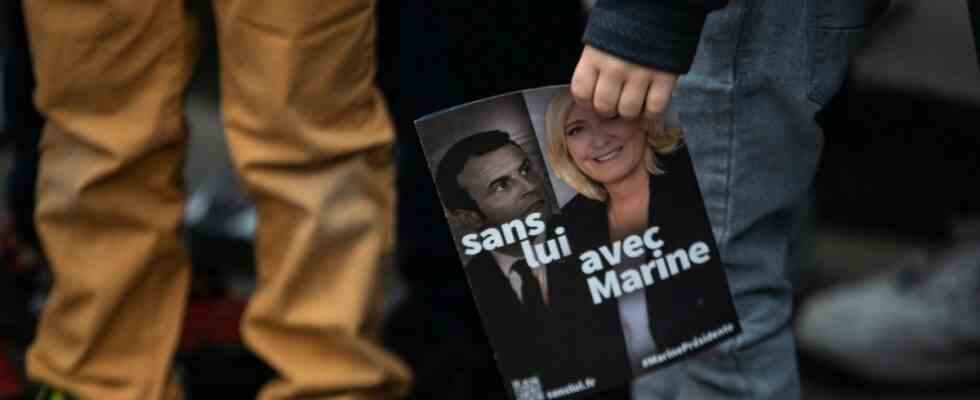First the orderly part: On the morning after the second round of the parliamentary elections, France’s newly elected MPs came to the Palais Bourbon on the Seine, the seat of the National Assembly, and beamed for the cameras. The upholstery of the seats in the plenary chamber had been cleaned, new large screens had been installed, and each elected person was handed the insignia of his office: the blue, white and red sash that is worn proudly across the chest on official occasions.
The only thing that is completely uncertain is where the 577 sash wearers will head in the coming weeks. France is in an unprecedented situation this Monday. So far, the Fifth Republic has known two scenarios after the presidential election: Either the newly re-elected president is given an absolute majority by the citizens in the parliamentary elections and can then comfortably bypass the parliamentary opposition. That has been the case for Emmanuel Macron for the past five years. Or the citizens give the opposition an absolute majority in the parliamentary elections. In this case, the opposition forms the government, the president concentrates on foreign policy issues, and the country settles in with “cohabitation,” the “living together” of two opposing groups. This was the experience of conservative President Jacques Chirac, for example, who endured cohabitation with socialist Prime Minister Lionel Jospin from 1997 to 2002.
Cohabitation presupposes a united opposition. There isn’t
However, the principle of cohabitation presupposes that there is a united opposition in parliament that can hold 289 seats. That is not the case in the newly elected National Assembly. Unlike until 2017, in France there are no longer two large blocs, left versus right, represented by the socialists on one side and the conservatives on the other. The country is now officially divided into three political powers. And these three forces have each declared the other two architects of doom with such fervor that a collaboration seems unlikely.
In other words, there is no longer “the” opposition, as was the case when the conservatives positioned themselves against the socialist President François Mitterrand or the socialists against the conservative Jacques Chirac. Rather, there is a left that, under the leadership of Jean-Luc Mélenchon and his France Insoumise, has declared war on social-democratic compromise thinking. And a right in which Marine Le Pen’s Rassemblement National is the largest faction. A party that five years ago called for Frexit and the exit from the euro.
The Macron Alliance “Ensemble” is the largest group with 246 MPs. But that is not enough to pass a law. Macron’s supporters now have three alternatives: They learn a completely new style of politics and forge compromises. And look for a new majority for each new law. In the past five years, however, Macron’s La République en Marche party has attracted attention less for its political skill than for waving the resolutions of the president, i.e. its party founder, through parliament as quietly as possible. Should compromises fail, the government also has the means to fall back on paragraph 49.3. This constitutional article makes it possible to pass laws without waiting for a vote in Parliament. However, paragraph 49.3 can no longer be used indefinitely as before, but only once per session year.
Another solution could be to ally with the members of the Républicains and the other Conservatives, who together have 64 seats. As kingmakers, the Républicains could then have a much greater influence on the composition of the government than their modest voting success would suggest. Only among the Républicains there are hardly any prominent supporters of this idea of a “government pact”.
Government circles are already being quoted as proposing new elections
Finally, the third idea seems to have been born out of panic, but was lively discussed: dissolve the National Assembly and hold new elections. Local media extensively quoted “government circles” who mused aloud that the new parliament would make the country ungovernable and therefore unable to exist. However, there was clear criticism of this strategy within the government. Agriculture Minister Marc Fesneau said: “The voters have decided that one cannot “play with the constitution”.
It will also be decisive in the coming days how the opposition is sorted. The unelected but de facto leader of the left-wing Nupes alliance, Mélenchon, on Monday midday called on the remaining Nupes members to form a common faction within the National Assembly. A proposal initially rejected by the Socialists, France’s Greens Europe Écologie les Verts and the Communist Party. If the left-wing parties, which divided the constituencies among themselves as the Nupes alliance, do not form a common faction, Marine Le Pen’s Rassemblement National will form the largest opposition group in parliament. That would have significant political consequences: the right-wing extremists could then take over the leadership of the finance committee.

